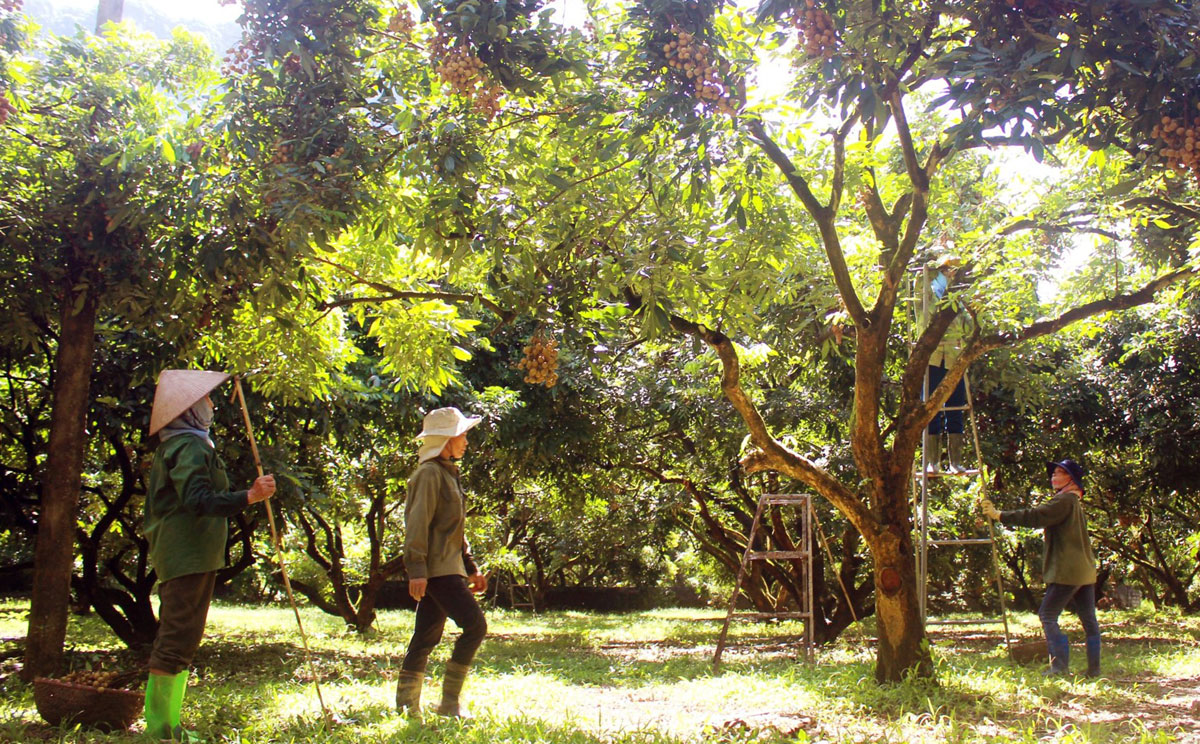
(HBO) - Support activities for granting production unit and packhouse codes have been piloted in Hoa Binh province since 2019. As of April 2021, in the province, there were eight valid production unit codes (longan, banana and dragon fruit) with a total cultivated area of nearly 80 hectares, and seven packhouse codes for fresh fruits. Growing areas are regularly monitored for pests and for meeting food safety requirements. The quality of products is ensured, meeting the increasingly strict demand of the domestic market, and step by step serving export.
 In 2020, 120 tonnes of Son Thuy longan (Kim
Boi) exported to China.
In 2020, 120 tonnes of Son Thuy longan (Kim
Boi) exported to China.
Experiencing the year 2020 with many
difficulties caused by unfavourable weather and the COVID-19 pandemic,
households that grow red dragon fruit in Quyet Tien residential area in Ba Hang
Doi township (Lac Thuy) are now excited to welcome the new crop with positive
signs.
This year's production is considered to be
quite favorable, and the total output of red dragon fruit is estimated at over
300 tonnes. Local households are building cold storage, packaging facilities to
better preserve products, thus meeting market demand.
The provincial People's Committee has
listed orange, tangerine, pomelo and high-quality rice as the province’s key
products. The province also has many products that have received special
attention such as longan, dragon fruit, banana, zucchini, and pumpkin and that
have many regional advantages.
It is necessary to issue more mechanisms
and policies in support of granting production unit codes for the province’s
key and advantageous products, strengthen management over production unit and
packhouse codes, and create favourable conditions for monitoring production and
quality of agricultural products./.
Dao Village’s honey – a product certified with a 3-star OCOP (One Commune One Product) rating by Thong Nhat Agricultural Cooperative in Dao Village (Hoa Binh City) – is highly regarded by consumers for its quality, richness, and variety in packaging. The distinctively sweet taste of Dao Village’s honey leaves a lasting impression on anyone who has tried it.
In alignment with Project No. 07-DA/TU, issued by the Hoa Binh provincial Party Committee on November 1, 2021, Lac Thuy district has actively promoted investment and supported the sustainable development of its industrial and handicraft sectors during the 2021–2025 period. Alongside this, the district has remained committed to preserving and revitalising traditional craft villages.
Located in the northern part of Lac Thuy district, with a temperate climate and fertile soil, Phu Thanh commune has great potential and advantages in growing tea. The long-standing experience, combined with strict adherence to organic farming practices in the tea gardens, ensures that the dried tea products from Phu Thanh and Lac Thuy as a whole are sold out immediately upon production, providing a stable and prosperous life for the local people.
Amid efforts to streamline the administrative apparatus, Hoa Binh province has intensified measures to address challenges in land clearance, resettlement support, and infrastructure investment, aiming to speed up the progress of key projects.
Hoa Binh province has posted an unprecedented economic growth rate of 12.76% in the first quarter of 2025, marking its highest quarterly performance to date and positioning it as the second fastest-growing locality in the country, trailing only Bac Giang province.
Under current regulations, products in the One Commune – One Product (OCOP) programme that are rated three stars or higher must undergo re-evaluation every three months. However, in reality, some of these products fail to consistently meet the required standards, raising concerns about the sustainability of their OCOP certification. This underscores the urgent need for producers to enhance product quality and gradually develop their OCOP products into strong, marketable brands.



 In 2020, 120 tonnes of Son Thuy longan (Kim
Boi) exported to China.
In 2020, 120 tonnes of Son Thuy longan (Kim
Boi) exported to China.